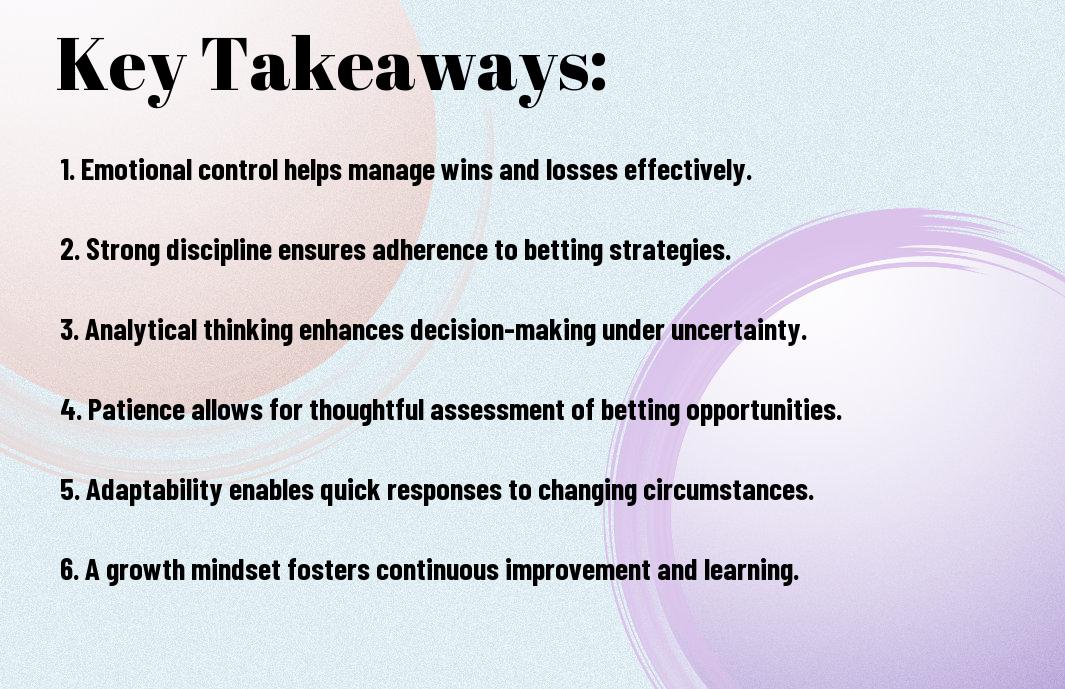As you consider your betting strategy, your mindset plays a significant role in determining your success. You may wonder what sets successful bettors apart from others. Your approach to betting is influenced by your psychological traits, which can either make or break your betting experience. You will learn how your thought process, emotional control, and decision-making skills impact your betting outcomes, helping you to refine your approach and make more informed decisions.

Key Takeaways:
- Emotional control is a key trait of successful bettors, as it enables them to make rational decisions and avoid impulsive choices based on emotions such as fear, greed, or excitement.
- A successful bettor tends to have a growth mindset, being open to learning from mistakes and adapting their strategy to improve their chances of winning.
- Discipline is imperative for bettors, as it helps them stick to their strategy and avoid chasing losses or getting carried away with wins, which can lead to poor decision-making.
- Successful bettors often possess a high level of self-awareness, understanding their own strengths, weaknesses, and biases, and using this knowledge to inform their betting decisions.
- Effective bettors are able to manage their bankroll wisely, setting realistic goals and limits, and avoiding the temptation to bet more than they can afford to lose, which helps to minimize financial risk and maximize potential returns.

Risk Management Psychology
The ability to manage risk is a key trait of a successful bettor, and it involves understanding your own psychological biases and limitations. You need to be aware of your risk tolerance and adjust your betting strategy accordingly. This includes setting limits, managing your bankroll, and avoiding impulsive decisions.
Emotional Control
Following a losing streak, you must maintain your composure and not let emotions cloud your judgment. You should develop strategies to manage your emotions, such as taking breaks or seeking support from others, to ensure that you make rational decisions.
Loss Tolerance
Psychologically, you will encounter losses, and it’s crucial to develop a mindset that can handle them. You need to understand that losses are an inherent part of betting and that you should not let them affect your confidence or judgment.
A key aspect of loss tolerance is accepting that you will experience a series of losses at some point. You should prepare yourself for such events by setting realistic expectations and having a plan in place to manage your emotions and adjust your strategy as needed. This will help you stay focused and make better decisions, even in the face of adversity.
Decision-Making Framework
Some of the most successful bettors have a well-defined decision-making framework that guides their betting choices. You will find that having a clear framework helps you make informed decisions, rather than relying on intuition or emotions.
Analytical Thinking
Beneath the surface of a successful bettor’s decision-making process lies a foundation of analytical thinking. You will need to break down complex information into manageable parts, analyzing data and statistics to inform your bets.
Cognitive Biases Recognition
Across various aspects of betting, you will encounter cognitive biases that can impact your decisions. You must be aware of these biases and take steps to mitigate their influence on your betting choices.
Hence, as you develop your decision-making framework, consider the potential for cognitive biases to affect your thinking. You can take steps to minimize their impact, such as seeking outside perspectives, taking a break from betting, or using data-driven approaches to inform your decisions, allowing you to make more objective and informed choices.
Self-Discipline Traits
For a successful bettor, self-discipline is imperative in maintaining a winning strategy. You need to be able to control your emotions and make rational decisions, even in the face of adversity. This trait is what sets successful bettors apart from those who struggle to achieve their goals.
Bankroll Management
Characteristics of effective bankroll management include setting a budget and sticking to it, as you will be able to avoid making impulsive decisions that can deplete your funds. You should prioritize managing your bankroll to ensure long-term success.
Strategic Patience
At the heart of strategic patience is the ability to wait for the right opportunities, allowing you to make informed decisions that align with your goals. You will be able to avoid impulsive bets and stay focused on your strategy.
Indeed, strategic patience is a key component of successful betting, as it enables you to analyze situations carefully and make deliberate decisions. You will be able to weigh the risks and potential rewards, giving you a significant edge over impulsive bettors, and ultimately, helping you achieve your betting objectives.
Information Processing
Not all bettors are created equal, and your ability to process information is what sets you apart. You can learn more about The Psychology Behind Successful Sports Betting to improve your skills.
Data Analysis Skills
Assessing data is key to making informed decisions, and you need to develop skills to analyze information effectively, considering various factors that impact your bets.
Pattern Recognition
With practice, you will develop the ability to identify patterns, which is important for predicting outcomes and making successful bets.
Another aspect of pattern recognition is being able to adapt to changing circumstances, allowing you to adjust your strategy and stay ahead of the game, as you continue to learn and improve your betting skills.
Social Intelligence
Keep in mind that social intelligence plays a significant role in your betting decisions, as it helps you understand the dynamics of the betting community and make informed choices.
Market Psychology
Following your analysis of the betting market, you will notice that market psychology influences your decisions, and being aware of this can help you make more rational choices.
Crowd Behavior Assessment
Behaving like a savvy bettor, you should assess crowd behavior to identify trends and patterns that can inform your betting strategy.
Intelligence about crowd behavior assessment allows you to analyze the actions of other bettors, helping you to identify potential biases and make more informed decisions, which can ultimately lead to your success as a bettor, as you will be able to navigate the betting market with greater ease and confidence, using your knowledge of social intelligence to your advantage.
Adaptive Mindset
Many successful bettors possess an adaptive mindset, allowing them to adjust to changing circumstances and make informed decisions. You will need to be flexible and open to new information to stay ahead in the game.
Learning from Losses
Across various betting experiences, you will encounter losses, and it’s how you respond that matters. You can use these losses as opportunities to learn and improve your strategy, helping you to make better decisions in the future.
Strategy Refinement
Against the backdrop of an ever-changing betting landscape, you must continually refine your strategy to stay competitive. You will need to analyze your past bets, identifying what worked and what didn’t, to make adjustments and improve your chances of success.
In fact, refining your strategy is an ongoing process that requires dedication and a willingness to adapt. As you continue to bet, you will encounter new challenges and opportunities, and it’s your ability to adjust your strategy that will ultimately determine your success. You will need to stay up-to-date with the latest trends and analysis, using this information to inform your decisions and make the most of your bets.
Conclusion
As a reminder, you now understand the psychological traits that define a successful bettor. You have learned how to manage your emotions, set realistic goals, and make informed decisions. By applying these traits, you can improve your betting strategy and increase your chances of success. Your ability to stay disciplined and patient will serve you well in the long run, helping you to make the most of your betting experience.
FAQ
Q: What are the key personality traits of a successful bettor from a psychological perspective?
A: A successful bettor typically possesses a combination of traits including emotional stability, discipline, and a rational approach to decision-making. They are able to manage their emotions, particularly in the face of losses, and make informed decisions based on data and analysis rather than intuition or impulse. Additionally, successful bettors often exhibit a growth mindset, continuously learning and adapting their strategies to improve their outcomes.
Q: How does cognitive bias affect betting decisions, and how can bettors mitigate its impact?
A: Cognitive biases, such as confirmation bias, anchoring bias, and the gambler’s fallacy, can significantly influence betting decisions, leading to suboptimal choices. To mitigate these biases, bettors can employ strategies like taking a break from betting to clear their minds, seeking diverse perspectives, and using data-driven models to inform their decisions. Moreover, being aware of these biases and actively reflecting on one’s thought processes can help bettors make more objective, less biased decisions.
Q: What role does self-control play in the psychological profile of a successful bettor, and how can it be developed?
A: Self-control is a fundamental trait of successful bettors, enabling them to stick to their strategies, manage their bankrolls effectively, and avoid chasing losses. Developing self-control involves setting clear goals, establishing a disciplined betting schedule, and practicing mindfulness to manage stress and emotions. Additionally, successful bettors often set limits on their betting activities, such as daily or weekly expenditure limits, to prevent impulsive decisions. By cultivating self-control, bettors can protect their financial and mental well-being while pursuing their betting interests.



